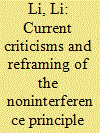| Srl | Item |
| 1 |
ID:
148535


|
|
|
|
|
| Summary/Abstract |
The “Five Principles of Peaceful Coexistence” was born against the background of poverty, powerlessness and humiliation. It became the guiding principle of China`s foreign policy since it was first proposed in 1953. However, several reasons led to increasing criticisms of it, especially regarding the noninterference principle. These reasons include the economic interdependence and blurring of boundaries in a globalized world, the rise of China`s power, and China`s extending overseas interests. The criticisms are reflected in three aspects: whether sovereignty allows for humanitarian intervention against the background of proliferating international human rights norms; whether China`s behavior obeys the noninterference principle; and whether this principle can serve China`s national interests. Chinese scholars respond to these criticisms in terms of three aspects: the noninterference principle should be flexibly interpreted depending on the specific background; many alternate terms of the principle like “creative involvement,” “constructive intervention,” and “participatory advocacy” were put forward; China`s sticking to the fundamental sovereignty principle has never changed. It is sensible and necessary for China to reframe the noninterference principle based on analysis from international, regional and domestic levels. This reframing should protect China`s national interests while matching the image of “responsible great power.”
|
|
|
|
|
|
|
|
|
|
|
|
|
|
|
|
| 2 |
ID:
141452


|
|
|
|
|
| Summary/Abstract |
The tianxia trope has been advanced as an organizing principle for post-Cold War international relations encompassing the rise of the People's Republic of China. The tianxia system is defined as a Sino-centric hierarchical relationship among unequals, governed according to Confucian principles of benevolence. As traditionally practiced, it incorporated an important role for the observance of ritual, including the presentation of tribute to the emperor as Son of Heaven, purportedly resulting in a Pax Sinica. Its supporters believe that, if adopted in today's world, tianxia would constitute a great improvement over the anarchic Westphalian system of theoretically equal states who possess sovereignty, i.e. inviolability within their own borders. Because they answer to no superior authority, the Westphalian system is by its very nature conducive to discord and war. This article will argue that both the tianxia and Westphalian systems have serious flaws and were rarely practiced as either their proponents or detractors argue. However, even states whose domestic autonomy is compromised by internal dissent and whose weaknesses prevent their playing an influential role internationally have vested interests in maintaining adherence to the Westphalian system, if only as a bargaining position. The PRC government itself has accepted the principles inherent therein through such actions as joining the United Nations and becoming a signatory of the Five Principles of Peaceful Coexistence. It zealously defends its sovereign prerogatives when useful, even as it makes efforts to educate the world on the virtues of a Confucian Great Harmony, and its supporters advocate following a somewhat nebulously defined Chinese model. In the absence of compelling incentives for major players in the current international system to adopt the tianxia system, Westphalian sovereignty appears likely to remain the organizing principle of international relations for the foreseeable future, its serious deficiencies notwithstanding. To paraphrase Winston Churchill's remarks on democracy, it may be the worst form of government except for all the others.
|
|
|
|
|
|
|
|
|
|
|
|
|
|
|
|